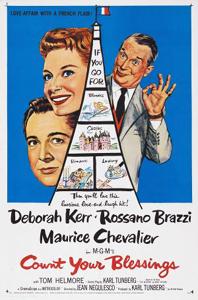| Count Your Blessings | |
|---|---|
 Original film poster | |
| Directed by | Jean Negulesco |
| Written by | Karl Tunberg |
| Based on | The Blessing 1951 novel by Nancy Mitford |
| Produced by | Karl Tunberg |
| Starring | Deborah Kerr Rossano Brazzi Maurice Chevalier |
| Cinematography | George J. Folsey Milton R. Krasner |
| Edited by | Harold F. Kress |
| Music by | Franz Waxman |
| Distributed by | Metro-Goldwyn-Mayer |
Release date |
|
Running time | 102 minutes |
| Country | United States |
| Language | English |
| Budget | $2,311,000 [1] |
| Box office | $1,710,000 [1] |
Count Your Blessings is a 1959 American romantic comedy drama film released by Metro-Goldwyn-Mayer. It was directed by Jean Negulesco, written and produced by Karl Tunberg, based on the 1951 novel The Blessing by Nancy Mitford. The music score was by Franz Waxman and the cinematography by George J. Folsey and Milton R. Krasner. The costume design was by Helen Rose.
Contents
The film stars Deborah Kerr, Rossano Brazzi and Maurice Chevalier.
The film was shot in London and Paris.